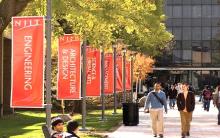The fundamental knowledge of the industrial engineering and engineering management profession encourages a systems viewpoint that permits us to reduce costs while at the same time maintain or further increase operational performance. The confluence of information technology and systems engineering has made the roles of industrial engineering and engineering management relevant in a wide range of industries. The supply chain contributes a very substantial portion to total product cost. Managing it requires the optimization of the entire system and its various components, that include among others, transportation, inventory, warehousing, materials handling, and customer service.
The graduate certificate in Supply Chain Engineering program at NJIT is designed to distribute this type of knowledge.
What are the Required Courses?
| Code | Title | Credits |
|---|---|---|
| Core Courses | ||
|
IE 659 *
|
Supply Chain Engineering | 3 |
|
EM 640 *
|
Distribution Logistics | 3 |
| Electives | ||
| Select two of the following: | 6 | |
|
EM 602 *
|
Management Science | |
|
EM 636 *
|
Project Management | |
|
IE 604 *
|
Advanced Engineering Statistics | |
|
IE 618 *
|
Engineering Cost and Production Economics | |
What will I learn?
- Supply Chain Engineering - Coordination of product manufacturing and logistic activities across the global supply chain is studied. Focus is on supply chain design, implementation, and control. Topics include transportation and distribution networks, inventory control, demand planning, materials handling and warehousing, supply chain contracts, manufacturing flexibility, product design for responsiveness, and ERP systems. Supply chain analytics concepts and relevant case studies are introduced.
- Distribution Logistics - Distribution logistics emphasizing systems engineering techniques used to optimize corporate profit and customer service: transportation modes; inventory policies; warehousing and order processing; and the best logistics gross margin.
- Management Science - Linear programming: formulation, methodology, and application; the transportation problem; the assignment problem; Markov chains and their applications in decision making; queueing systems; deterministic and stochastic inventory models.
- Project Management - Introduction to concepts of project management and techniques for planning and controlling of resources to accomplish specific project goals. While the focus is on technically oriented projects, the principles discussed are applicable to the management of any project. Topics include time, cost considerations, cash flow forecasting, financial and performance control, documentation.
- Advanced Engineering Statistics - The foundations of modern quality improvement, scientific basis of quality engineering, probability, statistical inference, statistical experimental design issues such as randomized blocks, factorial design at different levels, application to factorial design, building models, and implementation and critique of Taguchi's contributions. Statistical software is used in the data analysis.
- Engineering Cost and Production Economics - Cost management of operational activities. Focuses on capital investment decision making and efficient resource utilization to achieve cost-effective operations. Topics include alternative investment evaluation, budgeting activity based costing, quality costs, life cycle management and relevant behavioral science. These are considered in the context of manufacturing and service industry application
Why study Supply Chain Engineering at NJIT?
The NJIT supply chain initiative will help enable you to build flexible manufacturing solutions for use within small to medium-sized companies. You will help develop a methodology for evaluating the quality manufacturability of new designs from an assembly perspective. This program is related to all manufacturing industries and all transportation/distribution related service industries. Potential job titles include:
- Supply Chain Engineer
- Logistics Planner
- Transportation Analyst
- Terminal Manager
- Purchasing Agent
- Dispatch Coordinator
- Customer Service Agent
- Distribution Analyst
- Warehouse Supervisor
Prerequisites
Students who do not have a bachelor of science degree in industrial engineering may be admitted and required to complete the bridge program, especially in the areas of statistics, cost analysis and engineering economics. Bridge courses do not count toward degree requirements. A minimum of 30 credits beyond a baccalaureate degree is required.
Related Degree Programs
The graduate certificate in Supply Chain Engineering relates directly to the NJIT MS in Industrial Engineering, MS in Engineering Management, and MS in Manufacturing Systems Engineering
Faculty Advisor: Dr. Sanchoy K. Das
Available 100% online
Questions?
online@njit.edu
973-596-3462
